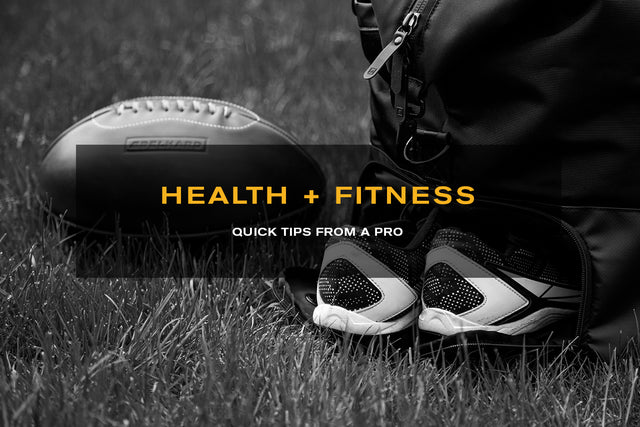Health and Fitness with Andrew Coe
A healthy lifestyle is not a binary decision. For many people, it’s important to continuously play with their diet and daily routine to ensure that they feel healthy. Just because a certain fitness plan works for one person doesn’t necessarily mean that it will work for another. With that being said, there are general rules beyond just exercise that many people forget, but which are vital to being a healthy individual. Both a member of our team and coincidentally also a professional rugby player, Andrew Coe, has helped teach us these important rules and how we can incorporate them into our daily lives.
Sleep.
Sleep is the body’s way of recovering after a strenuous day of activity and this is often overseen. The benefits of getting a good night’s rest go beyond physical health; it also vastly improves mental health, mood, and motivation. As Olympic athletes, we try to aim for a baseline of 8 hours of sleep. Depending on our training schedule, we may need up to 10 hours of sleep to get the proper recovery we need. Some tips that I follow to sleep better at night is to get outside as much as I can. The bright light and fresh air during the day helps me sleep at night. Another tip that is widely used and I can attest to is to reduce blue light exposure from screens at least 45 minutes before bedtime. Reading before bed is a great way to get off your phone right before bed.
Water.
I cannot stress enough how important water is to staying healthy. Water helps the recovery process of everyday activities, gives the body energy, and helps prepare the body for physical activity. Beyond the water we consume while training, we aim to have at least 2 litres of water outside of the training environment to ensure that the body is repairing from practice while preparing for the next day. One tip that I have found useful is to buy a 2 litre plastic water jug, draw on measurements with a permanent marker, and set goals for when you should have the water finished by (e.g. have 0.5 litres done by lunch). This can be done with smaller water bottles by setting goals on having to fill up your water bottle at a certain time. Another tip to drinking more water is to have a glass with every meal.
Supplements.
A common question that I receive is: what sort of supplements do I use on a daily basis? I think that many people would benefit from using the following supplements as it goes beyond rugby performance and is actually maximizing bodily functions in an effort to stay healthy.
- Omega 3: Omega 3’s or fish oils are beneficial to brain health and mental performance. It helps improve motivation, protects the brain from very minor injuries, and reduces memory loss.
- Vitamin D3: We only take these during the winter months when we get less sunlight exposure. It helps skin and bone health as it helps you absorb calcium.
- Vitamin B12: B12 helps with brain development and daily functions of the body. Many people do not get enough B12 on a daily basis.
- Melatonin: Sometimes when I can’t sleep I use a melatonin tablet to help induce sleep. This helps me make sure I get the proper amount of sleep so my body can recover after a day of training.
Fitness Tips:
Stretching.
Before any sort of activity, it is important for all the muscles of the body to be well-stretched, especially the muscles around the hip area. Stretching out the hips can reduce pain all over the body, including the dreaded lower-back pain. Here is a stretching routine that will help loosen all the muscles up. All exercises should be held for at least 30 seconds and the routine should be done at least twice through completely.
- Figure 4 stretch
- Lunge hip flexor stretch
- Piriformis stretch
- Butterfly stretch
- Quad Stretch
- Seated Hamstring stretch
- Calf Stretch
- Standing Shoulder across chest stretch
- Side lying open book stretch
For a visual aid, see the video below demonstrating this routine:
Warming Up.
Before starting any strenuous physical exercise, it is very important to get your body ready for the workload. Warming up will help loosen muscles and joints so they are prepared for a workout, while dramatically decreasing the likelihood of injury. Warming up through stretching and exercise that gradually intensifies is crucial to getting the most out of your workout while not getting hurt. Warmups can start static but need to be more dynamic as you start your workout.
- Light jogging
- Hamstring flossing
- Hip Thrusts
- Calf walkouts to hip flexor stretch
- Fire hydrants
- Walking Knee Hugs
- Arm Circles
- Air Squats
- Leg Swings
- Cat/camel
- Lunges
It is important to note that if anything feels tight, you should focus on that part of the body while stretching as it is more prone to injury. When working with weights, it is important to work up to heavy weights instead of just going straight to maximum exertion.
The recommendations and opinions listed in this article are written with the intention to support healthy living and are not medical claims. We do not endorse any of the recommendations listed in the article, we are only presenting them as considerations and not actual fact. There is a possibility of injury with each suggestion listed. Please consult a medical professional for any questions or concerns regarding the medical implications that exist with each recommendation in this article.


